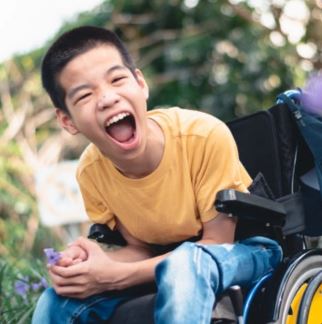Connecting Families: Film Screening: Imagining the Indian: The Fight Against Native American Mascoting & Panel with Indigenous Leaders & Activists
Online EventConectando famílias Conectando famílias 连接家庭 Konekte Fanmi yo Kết nối gia đình 가족 연결 This event will be hosted with access to interpretation and transcription in 20+ languages. Accessing Interpretation Description Join us for a screening of Imagining the Indian:
Basic Rights: Transition Planning
Host: Walpole Public Schools This presentation addresses the planning involved when a student is of transition age. The importance of planning, the roles of both parent/guardian and student and the student’s post-secondary vision. We will discuss how to prepare for the transition planning meeting, the age of
Families as Partners in the IEP Process
John J. Ahern Middle School 111 Mechanic Street, Foxborough, MA, United StatesFCSN and the Foxborough Public Schools are hosting an intensive training for families. Delve into the new IEP form and learn skills families can apply as active partners in the IEP process. Session Topics: The New IEP Form Crafting Effective Student/Parent Concerns Advancing Your Student’s Voice Throughout
RTSC Online Orientation Training 05/06/24
Online EventBecome a Special Education Decision-Maker for a Child in State Custody Volunteers, known as Special Education Surrogate Parents (SESPs), serve as appointed educational special decision-makers for students in the custody of the Department of Children and Families (DCF). SESP volunteers have the legal authority of a parent or
Basic Rights: Evaluation and Eligibility
Host: Athol-Royalston Regional School District This presentation is a comprehensive introduction into special education laws and procedures. We will delve into the purpose of the law, referrals, evaluations, and the team meeting process including determining eligibility. Further discussion will focus on services, placement, and what to do
Basic Rights: Understanding the IEP
Host: Fall River Public Schools This presentation was developed to help families gain a deeper understanding of the current IEP document. We will talk about why it is important, how it is developed and the different sections of the document. Further discussion will focus on what types
NextGen Careers Information Session
OnlineEvery Tuesday at 12 pm and 4:30 pm (1 hour sessions) A weekly Information Session for young adults, their families, and professionals interested in NextGen Careers. The NextGen Careers Information Session is a one-hour support session to better help eligible young adults (ages 18-25) their families and
Positive Solutions for Families: Train the Trainer May Cohort
Online EventAn offering for early childhood educators and professionals Through a grant provided by the Department for Elementary and Secondary Education, the Federation for Children with Special Needs is offering a FREE ten-hour training for educators and professionals interested in offering the Positive Solutions for Families program to families in their school. Learn
Basic Rights: Transition Planning
Host: Braintree Public Schools This presentation addresses the planning involved when a student is of transition age. The importance of planning, the roles of both parent/guardian and student and the student’s post-secondary vision. We will discuss how to prepare for the transition planning meeting, the age of
Introduction to the New IEP
Online EventIntroduction to the New IEP Form The IEP document will be seeing the first major change to the form in 20 years in the state of Massachusetts. This presentation will discuss: - Understand why changes have been made - Learn the timeline for implementation - Review the
Strengthening Partnerships: Training of Trainers Series
Online Event2024 Training of Trainers Series Family Engagement is not a one person job. It is an equity-driven, coordinated program that builds relationships aimed at improving outcomes for children and youth. Join MASFEC for an in-depth exploration of the Massachusetts statewide framework for family engagement and learn how
Basic Rights: Evaluation and Eligibility
Host: Waltham Public Schools This presentation is a comprehensive introduction into special education laws and procedures. We will delve into the purpose of the law, referrals, evaluations, and the team meeting process including determining eligibility. Further discussion will focus on services, placement, and what to do when
Bullying: What Parents Need to Know
Host: Revere Public Schools This presentation addresses what a bully is; the school’s legal obligation to prevent and address bullying; some strategies and tools for dealing with bullying; and how to address bullying in the IEP. We welcome both parents and professionals to join us for this
May Networking Series
OnlineAre you a: RTSC Special Education Surrogate Parent, PCTI trained Parent Consultant, or SEPAC Officer? Join us for a FREE opportunity to network, brought to you by Recruitment, Training and Support Center (RTSC), Parent Training and Information Center (PTI), and MassPAC programs of the Federation for Children
P2P Listening & Learning Training
ZoomBecome a volunteer Support Parent today! The Family TIES Parent to Parent Program (P2P) builds a bridge of connection between parents and caregivers of children with disabilities and complex medical needs who would like to talk with someone who understands their situation. We are actively recruiting new
Basic Rights: Understanding the IEP
Host: Pittsfield Public Schools This presentation was developed to help families gain a deeper understanding of the current IEP document. We will talk about why it is important, how it is developed and the different sections of the document. Further discussion will focus on what types of
Basic Rights: Evaluation and Eligibility
Host: Weston Public Schools This presentation is a comprehensive introduction into special education laws and procedures. We will delve into the purpose of the law, referrals, evaluations, and the team meeting process including determining eligibility. Further discussion will focus on services, placement, and what to do when


